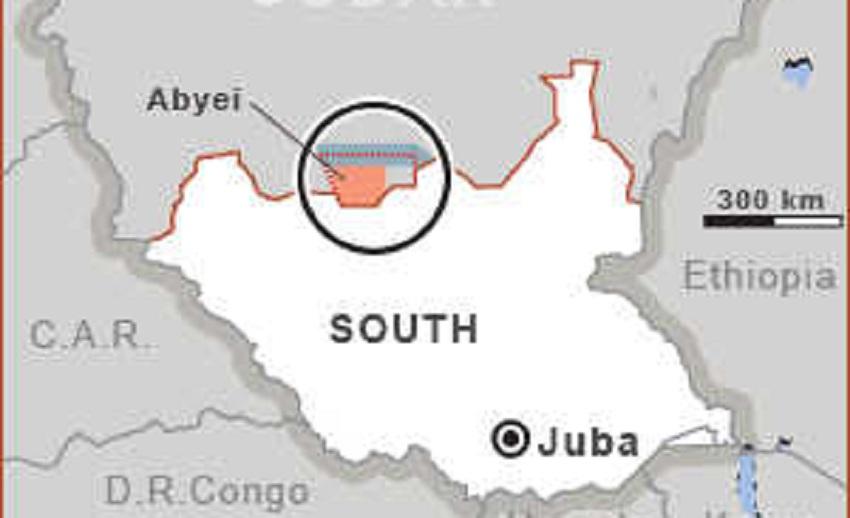Africa-Press – South-Sudan. There are media reports regarding deadly clashes in the Abyei areas in Southern Kordofan Willayya, of the Greater Kordofan, the Republic of the Sudan. The reports also indicated that many people have died as a result of the clashes.
The reports further showed that the contending ethnic groups in the clashes were the Misserriya Arab nomads and the Dinka herders. Both opposing groups are herders. They move north and south in this tiny regions, in search of water and grazing grounds, in a constant seasonal movements.
These movements sometimes bring the two groups into contacts. Some of these contacts are most of time not friendly. Resulting into violent clashes. The main triggers are disputable. But search for grazing grounds, water and fear of domination could be considered as the major factors for triggering fighting.
Reports also indicated that South Sudan (SS) has deployed troops in the Abyei areas to stop the clashes. It’s hoped such military actions, if done in coordination with Khartoum, may temporarily halt the clashes. But military actions are not panacea to ethnic clashes.
Authorities should address the roots causes of clashes between Misserriya and the Dinka in Abyei areas. The same calls apply to clashes in different parts of SS, Dar Al Fur and other areas in Sudan.
What this article claims is that fear is the main causes of clashes between Misserriya and the Dinka in addition to the other factors alluded to above. The feeling by Z that X is trying to take the land of Z can become dangerous fear. Fear affects every human beings: the strong, the weak, the rich, the poor, all become defensive or aggressive in defending and protecting their rights. The result is bloodsheds.
Fear has caused lots of problems for men, women and ethnic groups alike. Same for public and private institutions and organizations. The military and other organized forces or services. Even Sovereign States have suffered from the adverse impacts of fear.
The great wars known to date were triggered by fear that overwhelmed the military and political leaders of countries involved in those destructive wars.
One may refer to the 100 years war, 30 years war, the Napoleonic wars in Europe, liberation wars in the Americas, Africa and Asia. One may add the two world wars, the Fulklands war, the Iran – Iraqi wars, the two Gulf Wars, the current fighting in Ukraine, and so on.
One central factors for the eruption of those wars was fear, in addition to political, military, social, economic and religious causes.
This article will provide a liberal view point of fear. It’s llustrated by numbers of examples. Some examples may be inconsequential. While others may be provocative. In both cases, the article beg readers forgiveness. In particular those who might be caught up in cross fires.
Speaking of fear, is like speaking about “unpleasant and strong feeling caused by the presence of or expectation of danger,” as the dictionary man or woman tells the readers. It’s “unpleasant”, because its effects are negative to the person siezed of fear and those who might be directly or indirectly involved, or concerned. It’s “strong” as can impact adversely on the weak.
The powerful – those with heavy bones: found among Mandary men and women, or Dongotona Latuka, Zande people, etc; the poor, or the rich, or those people called as Elites. No human is not affected by it. It may be embeded in the self or “caused by the presence of danger”, or the expectation of the unknown. This type is very destructive.
All humans, whether born with a Silver Spoon in his or her mouth, or drinking Meddida from a bowl made from clay then baked, or sipping Ethiopian coffee from a gold cup, or one who eats Beef Stakes imported from Australia, or an old cow’s inner parts purchased from Konyo Konyo market in Juba (assuming it’s still the same as at 2011). All these people have bouts of fear with varying degrees of intensity.
The findings of the article are that there are more than 15 types of bout of fear. Ten are chosen.
Fear is not a bad human attributes. Provided it’s controlled. If it’s allowed to degenerate to phobias, it can become potentially dangerous. For example, fear amongst citizens of SA about foreigners taking away jobs from them led to attacks against any person who was seen to be an alien.
The results were many deaths and destruction of property belonging to foreign nationals lawfully resident in SA. Government intervention came after the strong current had swept away caneos.
In 1897 Egypt and Britain invaded the Sudan. The cause of the invasion was fear by Egypt that the Mahdist State was planning to invade and occupy Egypt. The invading army was commanded by Gen Kitchener, a British. The major battle took place at Kerreri, north of Omdurman, the Mahdist capital. The Mahdist lost, and a Codoninion government was established over the Sudan. It lasted for 60 years.
When Khartoum reacted against those accused of attacking a patrol between Yirol and Rumbek, it was fear that such attacks could lead to Dinka uprising. Hence the decision to suppress it by brutal force. The expedition was commanded by a senior British military officer, who was governor of Equatoria.
The Pakistani – India wars were caused by mutual fear. Each country had apprehension that the other was dangerously scheming against its security and territorial integrity.
The Iraqi – Iranian wars had their roots in panic over the I’ll – intention of the other over territory and religion.
As all know, the second Gulf war was orchestrated by USA and UK on terror over weapons of mass destructions. Saddam’s weapons of mass destructions will remain a mystery as they were said not to exist. But how did Saddam managed to kill many Kurds in few hours, if extraordinary weapon was not used?
The current fighting in Ukraine is triggered by fear. West has dread of growing powers of both Russia and Ukraine. The two must be pushed to clash and effect mutual self-destruction. Unfortunately Ukraine and Russia have not seen the conspiracy.
Fear is dangerous. All must guard against it, or control it.
For More News And Analysis About South-Sudan Follow Africa-Press






